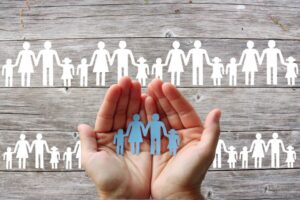When someone is struggling with an addiction to alcohol or drugs, the whole family can be affected. From spouse to children to parents to siblings, communication lines can break down, negative emotions can rise, hurtful behaviors occur, and bridges can be burned to the ground.
Here at Into Action Society, we understand that having a loved one struggle with addiction to alcohol or drugs can pose some challenges for you. From boundaries to enabling to not understanding how to be there for them, it can get confusing and frustrating.
Whether they are in recovery or they are still active in addiction, you want to learn how to best show up as support for them, while taking good care of yourself too.
Good news is that we offer programs that help the entire family.

If You’re Loved One Is In Active Addiction
It can be scary and challenging when your loved one is in active addiction. As much as you try not to worry, you find yourself fearful and anxious at times. The late nights or all-nighters, risky behavior, disappearing, lying – it can really wear you out.
You’ve probably had various discussions with them about their drinking or drugging.
And perhaps they cut down or stopped – for a while. But for one reason or another, they relapsed. This could have happened time and time again.
You may be seeking solutions or ways to help your loved one get treatment. Or you may be seeking support for yourself or family members due to the anxiety, fear, and other emotions you may be dealing with.
Finding the right support for you is just a call away. Contact us to learn more about how you can navigate your path while your loved one is struggling with addiction.
If Your Loved One Is In Recovery
If you have a loved one who is in recovery from alcoholism or drug addiction, learning how you can best support them to maintain sobriety is essential. Our family education program helps the families of those that are in recovery at our program learn skills and techniques that will benefit the whole family.
Topics may include:
- Is inpatient treatment the best route for my loved one?
- The disease of addiction
- What does recovery look like?
- What is an intervention? Is one necessary?
- What support groups are available? (AA, NA, Al-Anon, Nar-Anon, etc.)
- Best supportive skills to help your loved one remain in recovery
- Codependency recovery
- How to listen to your loved one
- Unconditional love
- Boundaries
- How to cope with the ups and downs of recovery
- Methods and models of change
- Cognitive behavioral therapy
- Relapse prevention
- Dealing with negative emotions (anger, hurt, resentment, shame, fear, sadness, etc.)
- Withdrawal symptoms
Understanding Addiction
If you have a loved one struggling with addiction, it may help you to learn about addiction and recovery. Take some time to do some research on the disease model of addiction. You might also want to read up on the whatever drug your loved one is or has been using.
Addiction affects the mind and body, causing a dependence on the drug. Stopping the drug is likely to cause uncomfortable withdrawal symptoms. The more you’re can learn about the withdrawal process, the better you’ll be able to show up as support for your loved one.
That’s why we spend so much time teaching loved ones about addiction as an illness, as well as recovery as a treatment. We use a biopsychosocial model of treatment, focusing on the psychological, biological, and social aspects of addiction and recovery.
Support System
You don’t have to cope with your loved one’s addiction or recovery on your own. Sure, it’s tough at times to understand their words or behavior. You want to be fully supportive, but at times it’s just hard. This is one reason we recommend support groups to attend. Others are in similar shoes and can offer valuable support as you and your loved one work on recovery.
Having a solid support network will help you suffer less, no matter what your loved one does. Taking advantage of groups like Nar-Anon or Al-Anon will help you focus on you and your life, while allowing your loved one to focus on theirs. It also helps to have a place to vent and be seen and heard. Going to your loved one with your concerns or frustrations all the time probably doesn’t pan out very well.
By attending a support group, you have people who understand and can hold space for you as you work through any issues you may have.
Family Therapy
You may desire to get into family therapy. We are here to support each member of the family in their recovery process. As a loved one of someone struggling with addiction, you may have some unresolved conflict, resentment, hurt, fear, and more going on in your emotions. Being able to openly discuss this in family treatment can help heal such wounds.
Everyone gets to have a voice in family therapy, as well as have a professional facilitate meetings. Maybe someone was too afraid to voice their feelings at home, but in the safety of a counseling session, they’re able to share what’s in their heart. This gives everyone an opportunity to hear and see each other, which is helpful in the healing process.
Reach Out For Help
If you’re interested in our family education program, don’t hesitate to reach out and give us a call. We’d be happy to answer any questions and explain the program better to you.